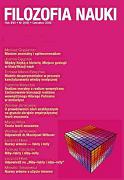O prawdziwości zdań analitycznych na gruncie skrajnie empirystycznej teorii znaczenia
Truth of analytic statements in a radically empiricist theory of meaning
Author(s): Wacław JanikowskiSubject(s): Philosophy
Published by: Uniwersytet Warszawski - Wydział Filozofii i Socjologii, Instytut Filozofii
Keywords: analytic; synthetic; meaning; truth; platitude; a posteriori; sociolinguistics
Summary/Abstract: The author presents his own conception of semantic analyticity accounted for from a thoroughly empiricist perspective on (descriptive) meaning. This conception includes the following theses. Meanings as entities constituted in social interactions should be investigated empirically by sociolinguistic methods. Each meaning is determined by a cluster of platitudes, i.e. sentences held as true or known in a given form by all (or almost all) competent language users. Each such sentence can be equivalently expressed in a form of conditional inference, or just possess this form. All these inferences are held, by competent language users, as connected to others, thus building a global semantic space. A sentence is accepted as meaningful only if it is inferentially connected to other sentences so that together they, at least hypothetically, relate to some determinate experiences. Hence all meaningful sentences are a posteriori true. Analyticity/syntheticity of proposition is relative to a degree and scope of being accepted or known in a given form of sentence expressing it. Evidently analyticity/syntheticity is a psycho-social matter. Sufficient degree of analyticity is called ‘platitudiness’. Analytic/synthetic distinction comes in degrees, is not strict, and a sentence’s being analytic/synthetic may change over time. There are many cases in which we cannot determine whether a sentence is more analytic than synthetic, or conversely.
Journal: Filozofia Nauki
- Issue Year: 17/2009
- Issue No: 2 (66)
- Page Range: 87-97
- Page Count: 11
- Language: Polish

